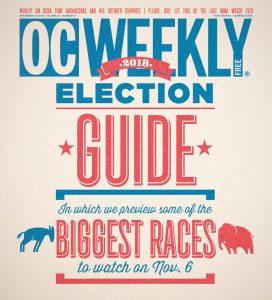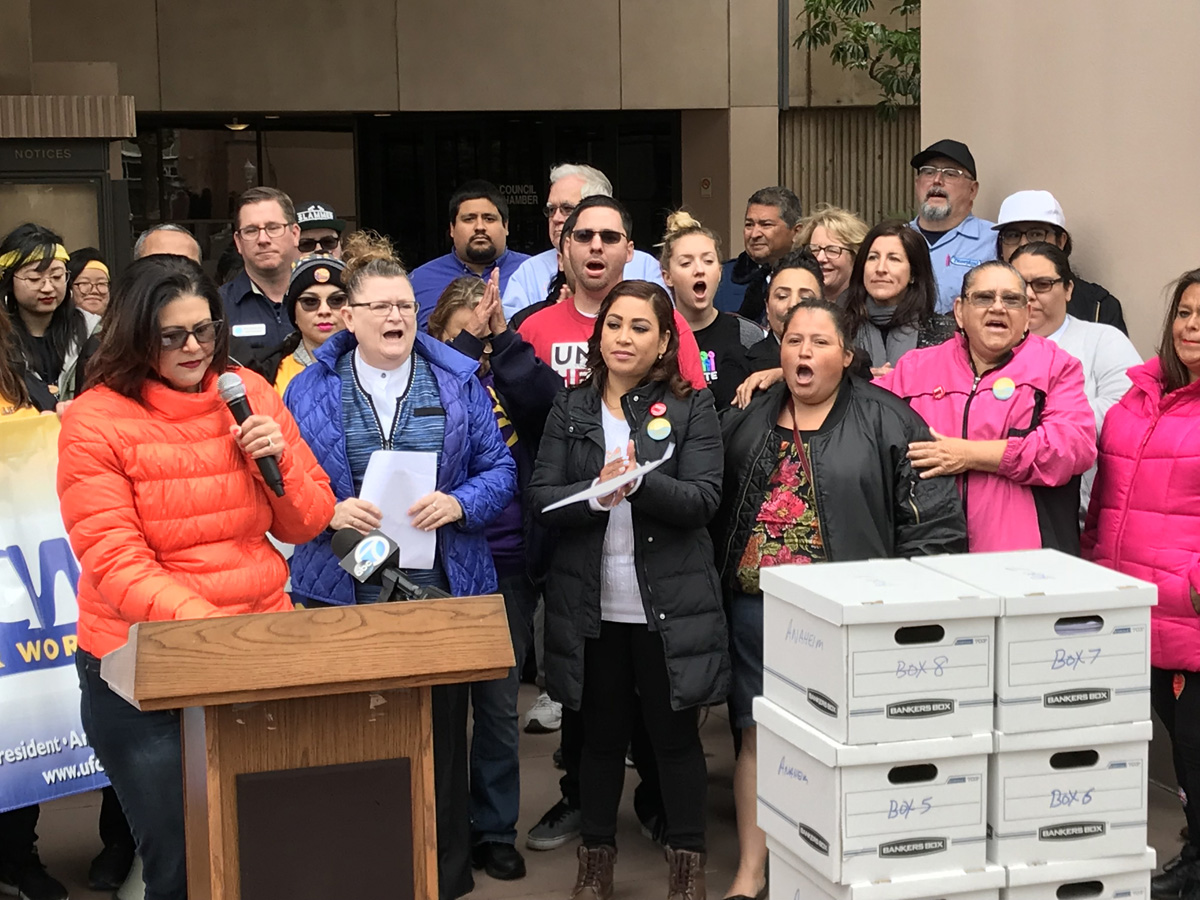
WILL KATIE PORTER UNSEAT MIMI WALTERS IN THE 45TH CONGRESSIONAL DISTRICT RACE?
Attending a Democratic candidate’s town-hall meeting in the Age of Trump can be a disorienting experience because our shared political rhetoric has become largely meaningless.
“Our rigged political system has reached a crisis point,” Katie Porter, a UC Irvine law professor challenging incumbent Republican Mimi Walters in the 45th Congressional district, said at a Sept. 19 University Hills town-hall meeting. According to Porter, our “culture of corruption” in Washington, D.C., is the “single most important issue we have to tackle in Congress.” She then promised the 100 or so people in attendance that “fixing our broken political system” would help to solve a wide variety of societal problems, including unaffordable health care and gun violence.
These phrases, repeated throughout virtually every congressional election this year, sound eerily like 2016 presidential candidate Donald Trump’s notorious promise to “drain the swamp” in Washington. Trump also said our political system was broken and repeated the word rigged so often that it’s hard for even liberals these days to have faith in our elections.
Of course, Democrats such as Porter still have faith in the system (though Porter says Congress must enact campaign-finance reform because it’s “a really central part of how you get young voters to believe” they should vote). Trump and his followers may see the entire democratic process as illegitimate, but for Democratic challengers, talking to voters is the only chance they have. “We don’t have to outrace the Koch brothers,” Porter said. “We don’t need our own [Republican investor] Sheldon Adelson—I don’t want my own Sheldon Adelson. We just need enough money to reach every potential voter.”
The fight over the 45th District—which includes Tustin, Orange, Irvine, Mission Viejo, Lake Forest, Laguna Hills, Laguna Niguel and parts of Aliso Viejo—has attracted national attention like no other in its history. The day before the Sept. 19 meeting, the political-news website Axios called the district one of eight races to watch this election. When The New York Times polled voters there in late September, Porter emerged with a narrow but definite five-point lead.
This should be unthinkable, as the 45th has long been a Republican stronghold. Political analyst Charlie Cook lists the district’s Partisan Voting Index (PVI) as an anemic R+3 (by comparison, Democratic Representative Lou Correa’s 46th District is listed as D+15). What’s more, in 2016, presidential candidate Hillary Clinton actually beat Trump in the 45th by 5.4 percentage points.
This is why I wasn’t so surprised to see a glossy mailer sent out by the National Association of REALTORS Congressional Fund calling on voters to elect Porter because she will “Fight to Allow Borrowers to Refinance Their Student Loans.” The mailer is part of a huge $410,000 independent expenditure by the SuperPAC on behalf of Porter. This SuperPAC not only hasn’t spent any money on behalf of Walters, but it’s also currently spending twice as much money on Republican candidates than Democrats, according to the most recent data posted by the Center for Responsive Politics.
So who is Katie Porter, besides being the law professor best known as a former student of Democratic Senator Elizabeth Warren? “I’m a mom of three very lightly supervised school-age children,” Porter joked at her University Hills town hall. It’s a joke I’ve heard her say elsewhere. Porter seems best when talking about her own experiences. A couple of weeks later, at a UC Irvine town hall, Porter talked at length about her family’s health care to a few dozen medical students.
Though she has very good insurance through UCI, her family incurred $11,000 in medical costs last year after her son got sick, she recalled. That was a good connection; not so good was when she turned a question from the audience about discrimination against Latinos who try to get health care around to her own experience spending 10 hours in a hospital with an inflamed appendix, saying her organ burst while waiting to see a surgeon because she was a single parent who had no one with her to flag down a doctor or nurse after she was administered pain meds.
At the University Hills town hall, the loudest applause came after Porter spoke about the need to make sure “our public schools are safe from [Education Secretary] Betsy DeVos and her dangerous ideas,” immigration (“I strongly oppose family separation”), and opening up Medicare for all. “Mimi Walters said I support universal health care,” Porter said at the town hall. “You’re darn right I do!”
Walters—who, like many of her fellow Republican members of Congress, doesn’t do town halls—has been a stalwart in the Orange County Republican Party since the mid-1990s. An investment banker by trade, Walters won a seat on the Laguna Niguel City Council in 1996. She then moved on to the state Assembly and Senate before getting elected to represent the 45th Congressional District in 2014.
In Walters’ first U.S. congressional election, she demolished Democrat Drew Leavens by more than 30 percentage points. Two years later, Democrat Ron Varasteh did better but still lost by 17 points.
For the most part, Walters is as Republican as they come: anti-abortion, pro-gun, anti-legalized marijuana. According to the Center for Responsive Politics, Walters’ biggest donors are real-estate interests ($221,000), securities and investments ($209,000), and Big Pharma ($175,000). She voted for Trump’s tax cuts for the wealthy (natch) and repealing the Affordable Care Act (double natch).
Incredibly, Walters apparently accepts the reality of climate change, but she didn’t fully articulate that until after Trump announced that the U.S. would pull out of the Paris Accords. Of course, Walters’ actual voting record is abysmal on the environment, earning her a lifetime score of just 4 percent from the League of Conservation Voters.
Not long ago, Walters’ stance on the environment was all but irrelevant to South County voters. That voters are talking about it now is actually a reason to be hopeful. Because regardless of who wins in November, the status quo on climate change, health-care access and gun violence will crush us all if left untouched. (Anthony Pignataro)

THE RETURN OF COMMIE/CAPITALIST TOM UMBERG AND THE FIGHT FOR THE 34TH SENATE DISTRICT
Down-ballot races are notoriously dull, but voters in the 34th Senate District saw some real comedy this election. That’s because Republican incumbent state Senator Janet Nguyen’s campaign sent out a mailer (in Vietnamese) labeling Democratic challenger Tom Umberg a “pro-communist,” “communist sympathizer,” and friend of actress Jane Fonda and her former husband, the late leftist state Senator Tom Hayden.
This wasn’t surprising, given Nguyen’s extreme dislike of Hayden. In fact, in February 2017, Democrats had Nguyen removed from the Senate floor after she went on a tirade bashing Hayden, who had died a few months prior, and refused to stop speaking after being ruled out of order. Jess Araujo, Umberg’s Santa Ana-based attorney, took extreme umbrage to the mailer, then sent a blistering response to Nguyen on Oct. 1 demanding an immediate retraction, but all that accomplished was alerting the press to the mailer’s existence.
Forgive yourselves if Umberg’s name sounds familiar, but you can’t quite place him. He’s a local Democratic Party retread, out of office for more than a decade but back to unseat his former rival.
While Umberg is many things—corporate attorney, former drug warrior, retired military prosecutor—he’s not a communist. In fact, he’s so anti-communist that he’s been labeled Republican-lite pretty much since he first got into politics. “I have to convince Tom Umberg that he’s in the wrong party,” the late Republican Assemblymember Gil Ferguson said in 1991. “He even looks like a Republican.” (Ferguson was so conservative that he once introduced a resolution denying that “Japanese-Americans were interned in concentration camps during World War II.”)
Ferguson’s reasoning lay in large part to Umberg’s friendly attitude toward Corporate America. In fact, in his first Assembly term, Umberg voted with Republicans against Senate Bill 144, which would have barred public financing of toll roads.
Umberg somehow manages to simultaneously occupy the space of both longtime politico and inexperienced outsider. First elected to the state Assembly in 1990, Umberg won re-election in 1992, then lost the race for state Attorney General in 1994. Banished to the political wilderness, he ran for state Insurance Commissioner in 2002, but lost. Two years later, he returned to the state Assembly, only to lose a state Senate race in 2006. He then reached for the 1st District Supervisor’s seat a year later, but he lost it—to Nguyen.
Umberg calls himself a “U.S. Army Colonel (Retired) and former federal prosecutor and state Assemblyman.” He last won election in 2006 for the state Assembly, which is also the only elected job he’s ever held. From 2008 to 2014, he held an appointed seat on the California High Speed Rail Authority, though that project’s missed deadlines and massive cost overruns hardly make it a bragging right. For the past 12 years, Umberg has been a partner at Umberg/Zipser, where he’s handled cases involving “health care, real estate, workplace harassment, construction defects, employee pension plans, etc.,” according to the Irvine law firm’s website.
Does any of this sound like the work of a devoted acolyte of Ho Chi Minh and Che Guevara?
How about the fact that in 1997, President Bill Clinton appointed him Deputy Director of the White House Office of National Drug Control Policy (ONDCP). It was the No. 2 drug-warrior spot in the federal government, and Umberg held it until six months before Clinton left office. The reason? So he could lobby for big corporations looking to do business in Latin America.
“When the Weekly first interviewed Umberg a few weeks after he left the White House, he said his upcoming client work involved ‘helping to build a hydroelectric facility in Peru, working on a telecommunications project in Mexico,’ and ‘assisting in privatization in other places in South America,’” we reported back in 2000.
We also shouldn’t forget the two years Umberg spent in Afghanistan (2009-2010), “lead[ing] the U.S. Military effort to attack corruption within the Afghan Army and police,” according to his campaign materials. Umberg even won a Bronze Star for that.
Never mind Umberg being a communist—are we sure he never took Ferguson’s advice and joined the GOP?
Actually, we’re pretty sure he’s a Democrat. During his last term as state Assembly member, Umberg voted in support of gay marriage. Planned Parenthood has endorsed him. Much of Umberg’s campaign money comes from attorneys and unions. In fact, former Irvine Mayor Larry Agran contributed $1,000 to Umberg’s campaign (and Orange County Business Journal editor Peter Weitzner contributed $250).
Umberg’s campaign bio mentions his work as a military prosecutor, and while he did spend time in Guantanamo in 2004, his years working for Clinton meant he wasn’t exactly Mr. Popularity. In fact, according to Jess Bravin’s 2013 book The Terror Courts: Rough Justice at Guantanamo Bay, which chronicled the formation of the military courts set up at the U.S. Naval base in Cuba to try alleged terrorists, Umberg had some powerful enemies.
According to Bravin’s book, chief prosecutor Bob Swann apparently loathed Umberg, even going so far as to reject the possibility of Umberg, a “media-savvy corporate lawyer,” becoming the prosecution spokesperson “with his trademark wave.”
“You’re a politician, and you’re worried about the press,” Swann “sneered” at Umberg, according to Bravin. “[Besides], if we had known you were a Clinton guy, we never would have asked you to come back here.” In fact, Bravin wrote that Swann “treated Umberg as if he were a spy for the current Democratic presidential nominee, Senator John Kerry of Massachusetts.”
Not quite a million people live in the 34th District, which includes portions of North and Central OC. Though nearly half the population is Latino, the Democratic and Republican candidates in the race are white and Asian, respectively. Umberg should have the edge, given that the district leans Democratic (40 percent, with 31 percent identifying as Republican), but Republican Nguyen won easily in 2015 with more than 58 percent of the vote. Given that the very conservative Little Saigon is in the 34th and a lot of the people there vote, it’s easy to understand why Nguyen would want to label Umberg a hated commie. (Anthony Pignataro)

DIANE HARKEY VS. MIKE LEVIN IN CALFORNIA’S FIGHTING 49TH DISTRICT
Straddling South Orange and North San Diego counties, the 49th Congressional District is another race with Blue Wave potential.
Democrat Mike Levin has been campaigning daily since declaring himself a candidate not long after Darrell Issa was re-elected by a tiny margin in 2016. The San Juan Capistrano resident and environmental attorney has raised a war chest with more than 150,000 donors, taking no PAC money.
Republican Diane Harkey’s platform boils down to this: I’ve been elected before—a bunch of times! The not-so-savory subtext is she’s been elected despite the Harkey family business being convicted of fraud and elder abuse and ordered to pay $12.5 million to bilked investors, a ruling upheld by an appellate court in July. Mostly seniors, the victims of this Ponzi scheme haven’t been compensated and are left wondering how Harkey has paid for her campaigns, mansion and fancy-ass car.
If you or anyone you know has a pre-existing medical condition, has been paying into Social Security and Medicare their whole lives, and doesn’t want those funds stolen to pay for further tax cuts for corporations and the 1 percent, vote for Levin. If not, then Harkey’s your gal, as her state Assembly votes prove. Proud of her A grade from the NRA, she’s running to repeal a state gas tax that has absolutely nothing to do with serving in the U.S. House of Representatives.
Her cluelessness extends to the environment. She claims she’ll get 45* to give California a waiver from offshore drilling just as he did for Florida. Because she attributes climate change to “volcanos” and such, she’s in favor of fracking, which, if you believe science over the oil and gas industry, is an earthquake inducer. Levin envisions clean-energy policies contributing to economic growth, as well as saving the world for future generations.
The two candidates faced off in an ABC7 San Diego debate on Oct. 2. Given 20 seconds to answer “What is the biggest military threat the United States faces at the moment?” Harkey said, “Ummm . . . probably, military threat. . . . I would say, you’ve got, you know, I mean, there’s a lot of cold wars right now—so, I would say maybe . . . maybe . . . uh . . . the . . . uh maybe the . . . uh maybe—pardon me, I’m just trying to think, there’s so many little threats around the world. . . . I’m thinking maybe it’s the, uh, you know, Iran is a problem? I think. Yeah, Iran.”
Levin, having the advantage of those spasmodic 26 seconds, followed up with “I’m deeply concerned about North Korea. This president went from, uh, asking for fire and fury [to] now saying that we have a love affair with Kim Jong-un. We need consistency and clear headedness, not this volatile foreign policy.”
Which answer makes you feel more secure?

WHO WILL BE THE NEXT MAYOR OF ANACRIME?
One way or another, the next mayor of Anaheim will make history by not being a gabacho for the first time. (Max Strobel, turn in your grave!) Among the four frontrunners, Republican Harry Sidhu is Indian-American. Democrat Lorri Galloway is Filipina. Republican Cynthia Ward is a white woman, as is Democrat Ashleigh Aitken.
Now that identity politics are all squared away, who’ll take over the “City of Kindness”? Tom Tait, Anaheim’s outgoing mayor, surprised many, including the Weekly, by turning against onetime pal and mayoral predecessor Curt Pringle with stern opposition to corporate subsidies. He even managed to finagle a council majority for his last two years in office. But will his legacy hold?
Traumatized by Tait’s turnaround, the city’s Resort Elite found a perfect tool in soulless Sidhu. Toward the end of his second term on the City Council in 2012, Sidhu showed no concern for any underlying causes of the Anaheim Riots that summer while others navel-gazed. After leaving the dais, he proved to be a loser thanks to his failed bids to become a supervisor or assemblyman. But now Sidhu’s back, promising to keep the Los Angeles Angels in Anaheim while scaring voters with tales of homeless folks and hypodermic needles.
Ward enjoys Tait’s support and touts a long record of civic engagement from the other side of the dais. She stood alone pleading with the council in vain to not approve more liquor licenses without sounding racist during Anaheim’s Gigante Mexican supermarket mess in 2002. Like Tait, Ward ditched the Resort Elite and vocally opposed taxpayer giveaways to corporations. She’s the only candidate not from Anaheim Hills, but she is also going to feel that three-way split of the women’s vote.
Besides Sidhu, Galloway is the other hopeful to get Mouse money from Disney. She served two terms alongside him on the City Council, but she criticized subsidies. Galloway vied for mayor in 2014, finishing a distant second. Even with small Disney donations causing suspicion among observers, she’s running a better campaign this time around and working the terrain to gain visibility for her already-recognizable name. Putting a sign up at the always packed Taqueria Los Güeros #1 in Anaheim? Smart move.
But the endorsed Democrat in the race is Aitken. Her power-broker pops, Wylie, brought to SanTanaheim the likes of Miguel Pulido and Loretta Sanchez, but he also sued the pants off Mickey Mouse. Despite being absent from the Anaheim Riots, KKK melees and subsidy fights, Ashleigh’s making up for it by championing the city’s living-wage measure. After 16 years of Republican stewardship, the Democrats are hot for the mayor’s seat in OC’s biggest city, and the younger Aitken is their ticket.
And that’s the irony of it all.
For all the sermons on district elections and Latino representation away from the Hills that progressive Dems delivered in the past, the primary focus this year is on Ashleigh Aitken and the only at-large seat left on the City Council. Next time, Anaheim! (Gabriel San Román)

DON PAPI‘S BANANA REPUBLIC
He has occupied a seat on the SanTana City Council since before Born in East L.A. came out—more than 30 years ago!—serving as mayor in 1994. But if City Councilman Sal Tinajero can’t beat him Nov. 6, Miguel “Don Papi” Pulido will be termed out in 2020, thanks to 2012’s Measure GG, which imposes an eight-year limit on the seat.
This election is an important one. SanTana faces a budget crisis, one that has voters deciding on a sales-tax initiative that will hurt working-class residents if passed. And the effects of the Santa Ana Police Officers Association (POA)-backed council members have already been made clear the past few years: raises for cops despite strained budgets, while squashing any police-oversight board, even after multimillion-dollar settlements in police-brutality civil cases.
The POA has certainly emerged as the big-money player in town. In 2016, the police union shelled out about $400,000, with three of its four endorsed candidates—Pulido, Jose Solorio, Juan Villegas—winning election. Even though the trio didn’t form a majority these past two years, they sure governed as if they did. And with a bigger war chest this year, the police union is backing Phil Bacerra, David Peñaloza, Mirna Velasquez and Pulido with hopes for a super-majority.
Bacerra has recently found himself embroiled in controversy. Griselda Govea, an ex-girlfriend, publicly accused the candidate of having been physically abusive during their past relationship. The Democratic Party of Orange County voted to suspend his endorsement. But the POA? All shrugs. Bacerra faces a sole opponent in Ward 4, former City Councilman Roman Reyna.
Rancho Santiago Community College District board president Nelida Mendoza is the only candidate standing between Velasquez and right-wing evangelical Santa Ana Unified School District trustee Ceci Iglesias (a.k.a. Latina Trump!) in District 6.
Ward 2 is the most competitive. In addition to Peñaloza, the ballot lists arts commissioner Sandra “Pocha” Peña Sarmiento, the prima of City Councilman Vicente Sarmiento, and investment manager Paul Gonzales.
Gonzales is the most likeable progressive in all the races. He wants to strengthen the Housing Opportunity Ordinance and introduce a law for just-cause evictions, both sorely needed in the wake of a rent-control initiative failing to get on the ballot. Bonus: He’d be the first openly gay City Council member elected in a city that’s home to OC Pride. (Gabriel San Román)

MEASURE L UPDATE
Tired of getting nickel-and-dimed by the Mouse, 11 local unions calling themselves the Coalition of Resort Labor Unions commissioned a study on Disneyland Resort cast members working in poverty that came out in February and served as a jumping-off point for a living-wage ballot campaign.
The proposed ordinance holds that any resort-area corporation with tax-rebate agreements with the city of Anaheim is subject to higher minimum wages. And since prior city councils made tax breaks rain on hotels and Disneyland like a stripper in industrial Anaheim, it sent the Mouse’s quislings into a panic. Bakers, janitors, housekeepers and other magic makers stood to make $15 per hour under the proposed wage scale, with $1-per-year raises until 2022.
Why even Uncle Bernie Sanders came to town and tough talked the Mouse. Opposition polling obtained by the Weekly showed Measure L with an easy path to victory at the height of its popularity.
But then, the living-wage campaign took more unexpected turns than Space Mountain. Disney settled two big contracts with decent pay raises over the summer while asking Anaheim to kill a pair of tax-rebate agreements, one for a planned luxury hotel that’s now canned. The Mouse seemed off the hook until the ordinance’s principal author interjected. Attorney Richard McCracken argues that a 1996 Disneyland expansion deal that diverts Disney taxes to pay off bonds for resort-area improvements is a tax rebate the company benefits from. The city attorney begged to differ.
If voters pass Measure L, a judge is likely to make the final call. But with the Resort Elite well-positioned to recapture city hall, the ordinance has use-value as roach repellent for any future tax-subsidy policies. (Gabriel San Román)


WILL KATIE PORTER UNSEAT MIMI WALTERS IN THE 46TH CONGRESSIONAL DISTRICT RACE? — Answer: No, because neither are running in the 46th.